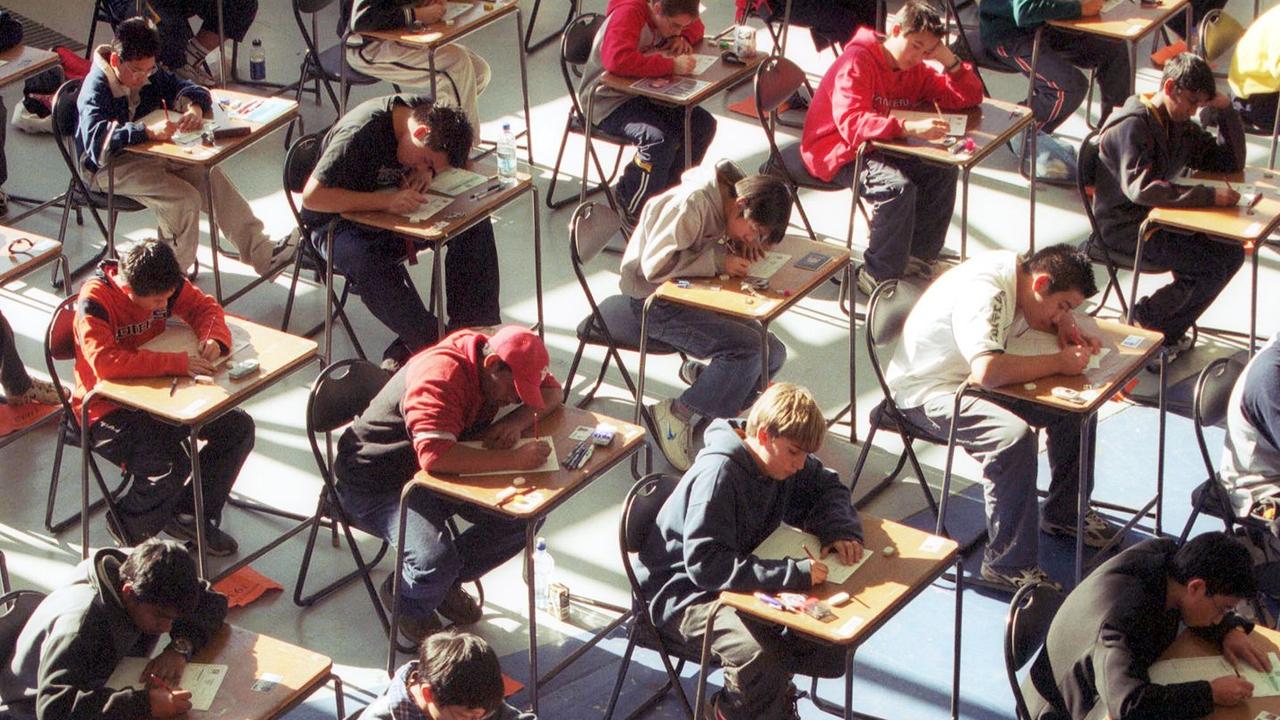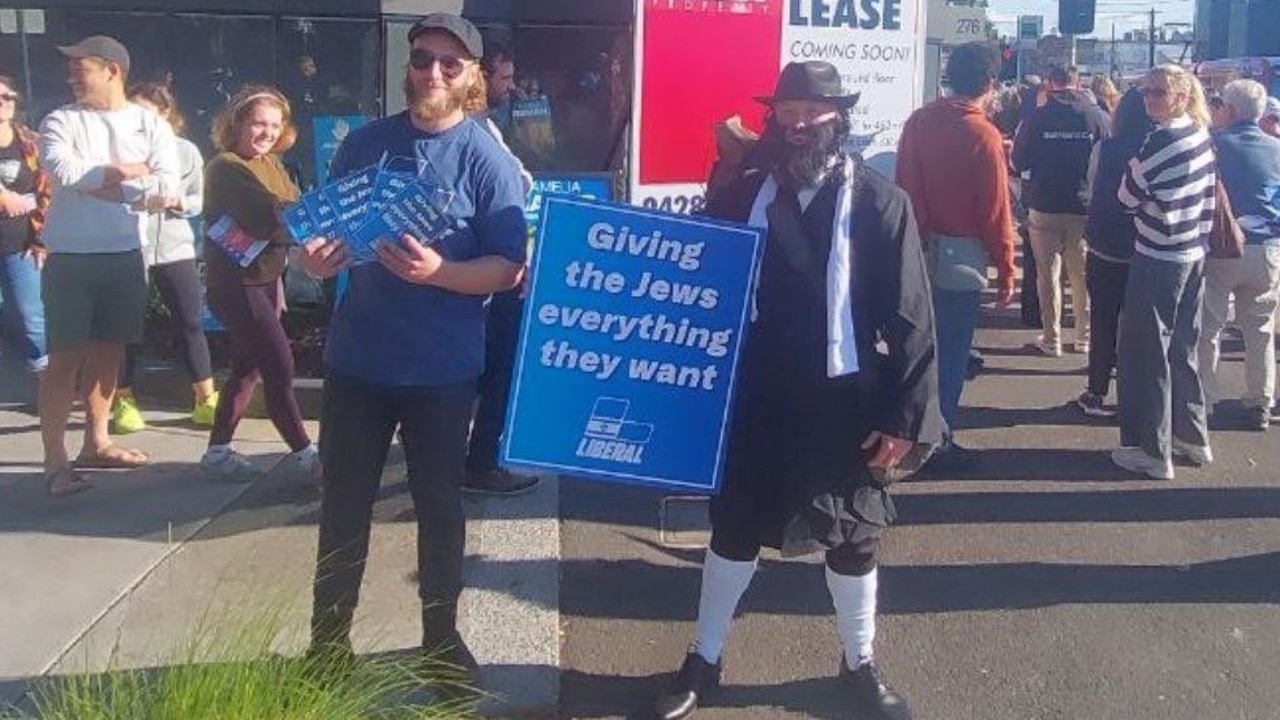Diagnosed with terminal cancer, Kellie Finlayson, 27, is not ready to say die
Wife of AFL player Jeremy Finlayson, Kellie, has terminal cancer. She hopes to live not just long enough to see her daughter off to school, but to celebrate other major milestones also.
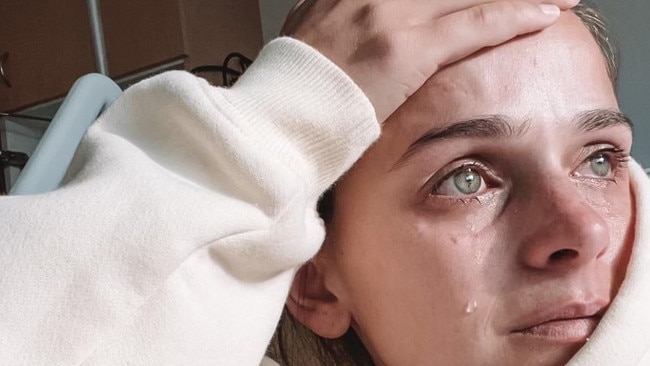
News
Don't miss out on the headlines from News. Followed categories will be added to My News.
Kellie Finalyson is 27, and has a completely uncertain future. She has been diagnosed with Stage 4 bowel cancer. She was married last month to AFL player Jeremy Finlayson, and they have a young daughter called Sophia. She wants you to know that you need to trust your instincts, get checked and don’t put off managing your health.
HM: When did your life get turned upside down?
KF: November 2021.
HM: What happened?
KF: That’s when I was initially diagnosed with Stage 3 bowel cancer or colorectal cancer. Within two weeks of tests and scans it was re diagnosed as Stage 4 as it was going up my back, which means it had moved from the primary location. Stage 4 is also known as terminal cancer.
HM: When you hear the words Stage 4 and terminal put into a sentence and you are the subject of it, where does your mind go and how do you suddenly change the way you live your life?
KF: I was unbelievably shaken up. It is surreal. It is life changing as it is life shaping.
Jeremy and I wrote a bucket list to see what we wanted to tick off
HM: What did you do?
KF: Jeremy and I wrote a bucket list to see what we wanted to tick off. We started living our lives not knowing how long is left. Removing the wasteful time and moments and removing wasted energy. It was scary as hell. Do I have five years? Less? More? How soon is Jeremy was going to be a single parent. If I were to pass, I would hope that he would find someone to help him raise our child eventually. But I was just thinking about Jeremy trying to be a mum and a dad with his career being the sole income for our family. And the anxiety around not knowing how Sophia was going to be brought up knowing her dad would’ve been ruined to a degree as well.
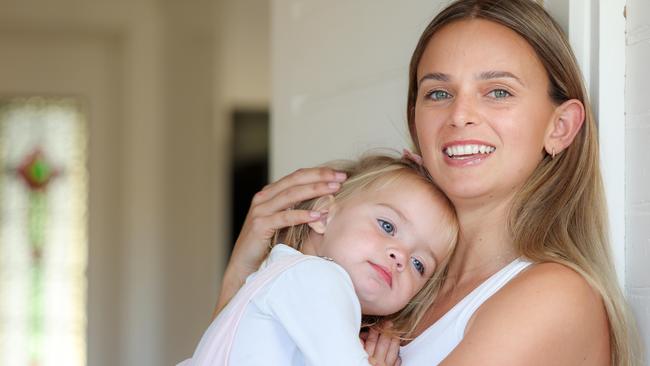
HM: You had to tell Jeremy, that the likelihood was that you were going have a much shorter life than you hoped?
KF: With difficulty. I had relapsed and was with my lung doctor. Having been diagnosed for 12 months, I was quite switched on with everything and knew how to read the screens. He was showing me where it had spread, he turned the computer around and the cancer was everywhere. It was in my pelvis, through my stomach, my lymph nodes and in my stomach lining. And I just knew that as soon as it had spread from the lungs, that it was the worst case scenario and there was probably not much that they could do for me. Jeremy didn’t know what to look for. He was in the room with me with the lung doctor and he’s like, ‘why are you so freaked out? Like, you’ve seen this a million times before, what’s different now?’ It wasn’t until I got into the car with him and he said: ‘It’s going be OK babe. We’ll get through it all again. We’ll go through a treatment again. As hard as it is, like we’ll do it again’.
‘It is everywhere, it’s a matter of time Jez’.
And I just broke down and told him how bad it was and how little they could do for me. ‘It is everywhere, it’s a matter of time Jez’. And he just went silent, pulled the car over and just wept. It felt like I was the professional, telling him the outcome. It was harder for him hearing it from me rather than him hearing it from someone else. He knew I understood what it all meant and I told him what it meant. He just cried and cried.
HM: What were your options at that point? Not, pragmatically, but medically.
KF: I immediately sought a new oncologist as I didn’t, obviously didn’t want to just get comfortable and hope for the best.
HM: When you say ‘get comfortable and hope for the best’, is that just go home, no treatment?
KF: Yeah it’s palliative care. They just give you pain medication. A nurse checks in weekly to see if you’re OK with the pain. But I’m only 27 and wasn’t in the frame of mind to go home and get comfortable. So I went and saw a new oncologist and we came up with a really good plan. I was so scared to start treatment again because I knew how hard it was last year. Knowing that I had to do treatment again scared the shit out of me but I knew it was the only way that I was going to prolong my life.
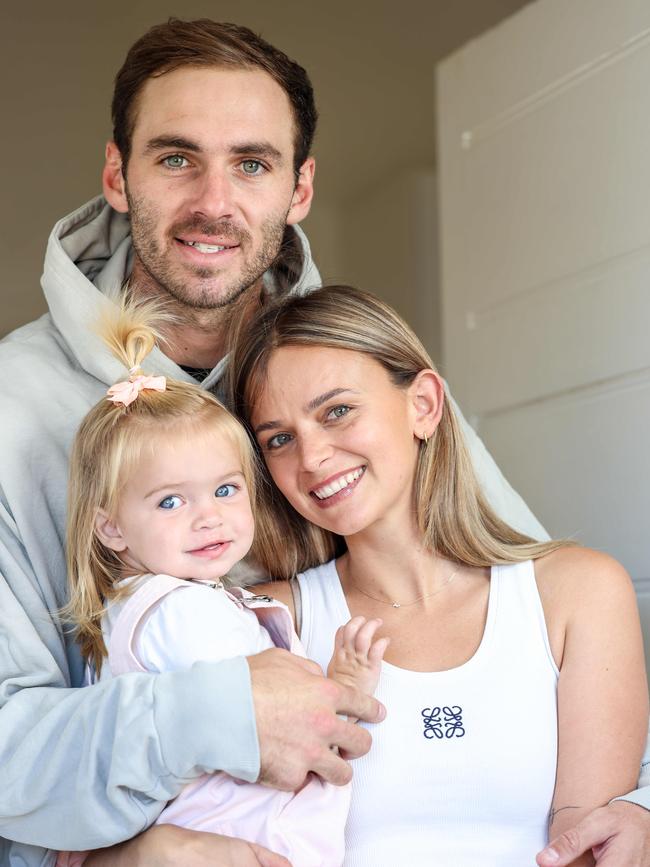
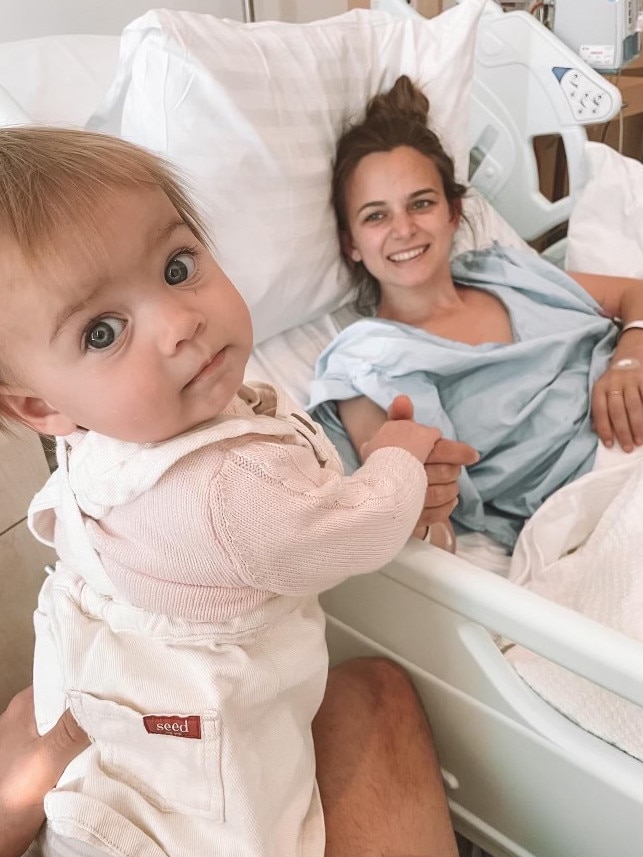
HM: What treatment have you now had?
KF: I’ve the radiation, the chemotherapy, and the surgeries all last year after my original diagnosis. I haven’t had a surgery yet this year and I’m hoping that my scan on the 27th of April will show that there’s no spread anymore and it is localised in my lung. I’m hoping that the chemotherapy that I’m on at the moment is doing its job, and will get to the point that I can just get the resection, which is the goal.
HM: What is the most painful part of the treatment? I mean, they’re effectively putting poison into your body that under no other scenario in the world they would consider putting it into you.
KF: Chemotherapy sucks. It really knocks you around. I’m really lucky my new oncologist is all about quality of life, especially because my disease is terminal so it’s going to be something I’m going to live with for the rest of my life. So the treatment plan that he’s put me on is a lower dose than what I was on last time, but a more aggressive chemotherapy. So it actually hasn’t given me many side effects at all. Out of the last 16 weeks I’ve been doing chemotherapy, I’ve only had about three days that I’ve been bedridden out of the entire time. It’s actually been easier compared to last time.
Stage 4 cancer is terminal but I’m lucky my cancer is responding well
HM: Can the treatment get you to a stage where you are in remission?
KF: All Stage 4 cancer is considered terminal, but I’m lucky that my cancer is responding well to the treatment. The goal is to eventually hit remission. My cancer reacts really well to chemotherapy in terms of wiping it out. The first time I had almost no tumour left at all, and it was a humungous tumour with a whole lot of spread, but I only had seven lymph nodes with microscopic cells in them showing out of everything that they removed.
HM: How do you manage being a mother and a wife with so much uncertainty surrounding you?
KF: It is hard. In terms of being unwell, I show up every day regardless, even if I’m feeling unwell. I’m lucky I’m still here. I still get to be Sophia’s mum. It is difficult in terms of not knowing what’s to come, it’s just making the most of what we’ve got. There are people that get diagnosed with cancer and are dead three months later. I’ve already lived 18 months as a cancer patient and feel so lucky that I have been able to still be around for Sophia’s life.
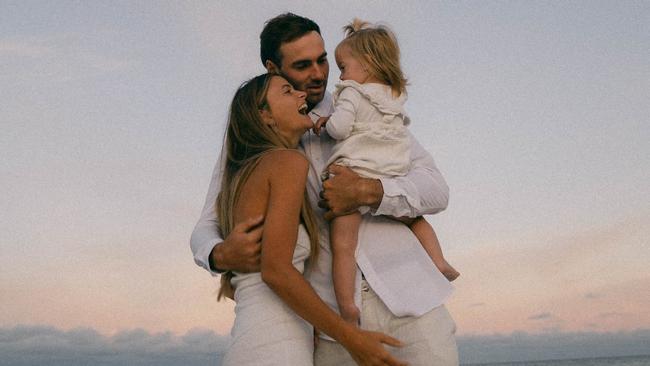
HM: What’s been your darkest day?
KF: The day that I got told that I was infertile. The day I got told that my night sweats were early onset menopause, so I went to an IVF doctor and got told that my levels were too high to basically ever produce again. That was my darkest day. Knowing that I couldn’t have the family that I’d always dreamt of since I was a little girl.
HM: Are there any options?
KF: Surrogacy or IVF are probably my only options now. My body just can’t possibly carry at the moment. I dreamt of adopting a child and giving them a better life. But now that I have a terminal illness, I’ve got a big red flag next to my name and it’s never going to be possible.
It was a dark, scary place and I felt a lot of hate for the world
HM: You were diagnosed at 25-year-old. It’s so early to be contemplating your own mortality.
KF: I was in denial for at least nine months that anything was really happening to me. I had so much faith in my medical team I just assumed my medical team would find a way to get me through it all. It was a dark, scary place and I felt a lot of hate for the world and I hated for everyone in it. But I quickly learned that the more positive I am about it, and the more I talk about, and even talking about my future, which at that time was only 12 weeks ahead, made things easier.
HM: Sophia was three months old when you were diagnosed – how much of her early life were you apart?
KF: I was basically robbed of my first year of motherhood. I wasn’t her mum at all. She had three, maybe four other women in her life that were her mum more than I was. So that was pretty hard.
HM: What do you do knowing things are so uncertain time-wise to make sure that you have an ongoing presence in her life? I had a friend that passed with MND and she wrote her two daughters a long book on her life lessons, and I’ve heard of people leaving messages for their milestones.
KF: I’m trying to make sure that I’m having a voice and that if I am to go, my legacy is something that she’s going be proud of and she’s going to feel proud of for the rest of her life. I have things in place in terms of writing for milestones but I haven’t written or recorded them yet.
I hope I see Sophia’s first day of school
HM: What is it that you have in your mind as the things that you need to do and in what time frame?
KF: Yeah, well, my bucket list starts with a South African safari. But it’s going to be a long list and I’m hoping that I can get to all of them in the next 60 years! But if I’ve only got five years, I hope I get to at least 10 of them. I just don’t know how long I’ve got. I don’t know how aggressively this disease is going to take hold of my body. At the moment I’ve got it under control and I feel like I am on top of it. As long as it is being maintained, I feel like I’ve got the potential to have quite a long life. I could see Sophia’s 21st birthday! I hope I see her first day of school.That’s still four years away and that’s obviously not that long, but it’s longer than I anticipated when I first heard the diagnosis.
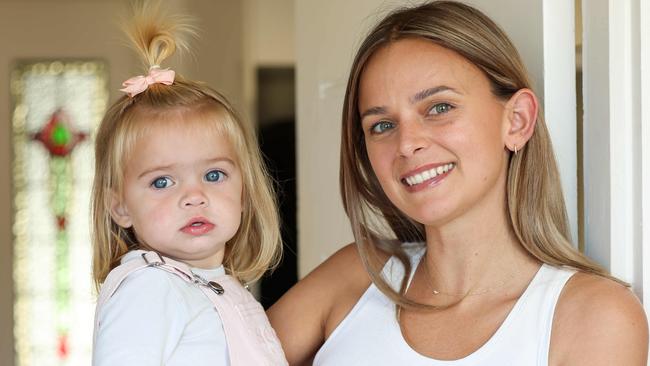
HM: Are you surprised at how strong and resilient you have been?
KF: Absolutely. I have always been a positive person. I have felt that I was getting support and being congratulated for how brave and resilient I was, and then I felt I had it in me to continue doing that. As soon as it started being noticed by others, I felt ‘oh wow, I can actually make a difference to people. There is purpose in that’. And if I can save one person’s life, then that’s incredible. And the more I speak about it, I feel like I’m not even speaking about myself. It’s really hard to explain, but the more I speak about the issue and the more I advocate for the disease and the early onset detection of the disease, I feel like I’m speaking about like a school friend or a relative or something. I don’t feel like I’m speaking about myself anymore.
HM: Going back a little – during Covid, you were booked in to have a colonoscopy?
KF: Yeah. I was.
HM: And that’s elective surgery. So you couldn’t?
KF: Yeah. So it was an elective procedure which all got cancelled because of Covid. They would’ve probably removed a non-cancerous polyp and I would’ve been fine. That’s a tough one to swallow.
They cancelled the colonoscopy in Covid
HM: Impossible to fathom. What were the symptoms for you at the time?
KF: I just had really bad abdominal pains. My bowel movements were not frequent – they were either extreme or not there at all. I had either diarrhoea or constipation for probably six months. So I did all of the herbal teas thinking maybe I had an intolerance. And then one morning I had wiped and there was blood on my toilet paper. So I went to the doctor’s and when I did my sample, there was no blood in the actual poo. They cancelled the colonoscopy when it came around because it was elective. It wasn’t urgent to them.
HM: Were you thinking that there was an urgency?
KF: I think I was too scared to know what the answer was so when they told me it was cancelled, I was kind of almost relieved. Because then I didn’t have to deal with it then.
I’m scared they won’t remember the real me
HM: What scares you most now?
KF: Not being able to see Sophia grow up. See all the things you hope to see your daughter do. All the milestones she will hit. And I’m scared for them to see me deteriorate. I’m sad for them that they will be left with that image of me. I watched my 80-year-old grandmother pass away. What I remember of her isn’t the real woman, so I’m scared they won’t remember the real me.
HM: If you could tell Jeremy anything – about being a parent that dads just don’t get – or anything else – what is it?
KF: I think he is very aware of how hard it is to be a mum and a dad. If there was anything I could tell him though, it would just to be patient. Be patient with Sophia, with fathering, with mothering, with life. And he needs to know that he is a better dad than he thinks he is. Don’t doubt yourself.
HM: What is it that you want Sophia to know?
KF: Good question. I think that I just want her to know that she can do anything she wants to if she puts her mind to it. I want her to know she can do whatever she wants from nothing.
HM: How has your diagnosis and your circumstances changed the way you view things that you previously didn’t?
KF: I was guilty of having a lot of first world problems. Perspective now is just huge. I still catch myself complaining about things that I shouldn’t complain about, but I quickly pick myself up and like, ‘Kellie, shut the fuck up!’There’s so many worse things in the world. And I notice others too. Jeremy might say ‘I’ve got to run 10km’s today’. And I’m like, ‘Jez, you get to run 10 km today – how amazing!’ I can’t run around the block without blowing because I’ve got an infection in my lungs, but you have to be grateful for the things you can do, rather than being pissed off for the things that you can’t.
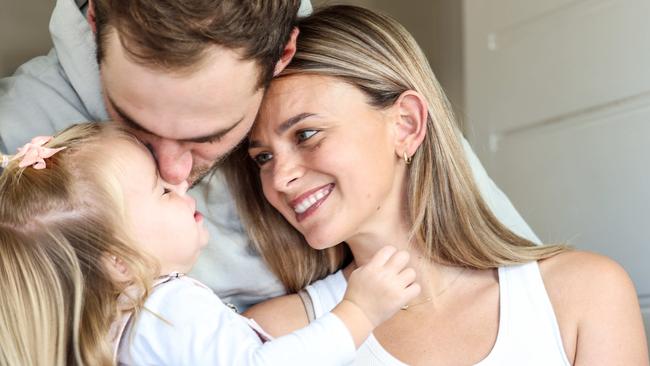
HM: Are you more present than you would’ve been with Sophia?
KF: A hundred per cent. Absolutely.
HM: What do you wish you knew 15-years-ago that you now know?
KF: Listen to your body. Trust your gut, which I use so commonly in any scenario now, whether it be an illness or medically related or relationship. Not wanting to go on a holiday because you think something’s up. It’s just trusting your gut and knowing that there’s a reason why you feel off about it and doing something about it.
HM: Do you lie awake at night? Scared?
KF: Not anymore.
I’ve sort of accepted my fate, whatever that looks like
HM: You did?
KF: I did. Yeah.I’ve sort of accepted my fate, whatever that looks like I’ve found an oncologist that I’m very fond of. He’s phenomenal. He’s all about my quality of life. I think that I do have a great quality of life for someone that is a cancer patient, which is not probably something you’ll ever hear from someone that’s suffering from cancer. but I’m making the most of a shitty situation, and I think that if I sweat on it, then I’m just wasting time.
HM: You are wanting to help people – however you can now – hoping they avoid your mistakes.
KF: I do. I’ve become an ambassador for the Jodi Lee Foundation. I’m working really closely with them on launching a new set of tools on awareness and follow up. I’m in the 24 to 34 age group, which is where they focus a lot of energy and time on. I’m working closely with Gavin Wanganeen who is helping, on an art campaign, with the awareness around the blood in the stool and stuff like that. I’m actually really excited by it.
HM: It kills a lot of young people. Bowel cancer needs to be talked about, but it’s not.
KF: So many die from it because it gets detected so late. Why? Because nobody talks about it! It’s not a sexy cancer – people don’t talk about their poo with their mates. It’s just not a thing. You don’t talk about it and say ‘Oh, are you regular this week?’ It’s just not something that comes up. It should. And if there is a problem – speak to your doctor – straight away – because they are literally there to talk about that!
HM: Is Sophia aware of what’s happening?
KF: She knows mummy’s sick, but she doesn’t know what’s really going on. She knows that I’ve got ‘owes’. When I get connected to my chemotherapy, I bring a bottle of chemo home for a slow release for 46 hours, so I’m actually attached to a chemotherapy bag through my port in my chest. She knows when she sees the band aids that mummy’s got ‘owes’, so for a couple of days after I get it off. She’ll check my chest every day – ‘Does mummy have owes?’ She knows I’m sick, but she doesn’t really understand what it is.
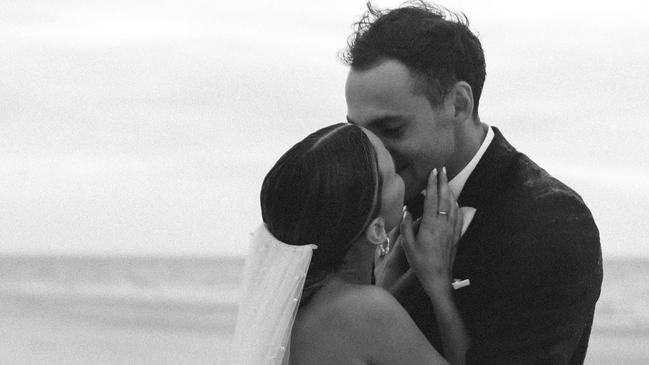
HM: Were there psychological impacts on your from the treatment?
KF: Oh, 100 per cent. I was disgusted in myself at times, physically. I used to have a colostomy and an ileostomy, actually. Which is literally your bowel diverted to your stomach. So the poo was then coming out of my stomach. You could never see anything or smell anything. It was never an issue for anyone else. But because I could see it and I knew what it was, it was a very uncomfortable feeling for me and I felt I lost all of my femininity. I guess I sound a little bit naive. I just hated it and it affected us.
HM: You and Jeremy?
KF: Yes, the intimacy was absolutely wiped, mainly because of the body image concerns on my behalf. Jeremy, didn’t care at all. He thinks I’m the most beautiful woman in the world and always will. But I got to a point where I wasn’t interested in even having a relationship at times. It felt so much easier on my own.
HM: Is that now – or was that then?
KF: Oh no, this is more like when I was going through all the surgeries and all the scars and the blood and the gore. It was gross. It was just not a nice time of my life. I got to the point that I was 49 kilograms! I wasn’t too attractive. Even now with chemotherapy, I can’t even kiss Jeremy because if I’ve kissed him when I’ve got chemotherapy attached to me, or still in my system, he’s then in a way having chemotherapy, it’s that potent.
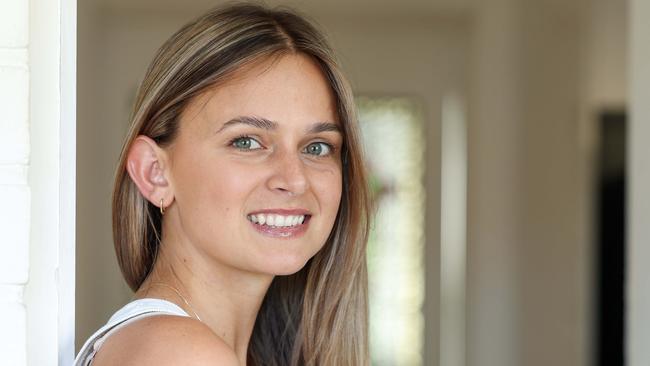
HM: What has been the key to maintaining a good, healthy relationship through it all?
KF: Communication. You have to talk. I would say it initially put a bit of a tension in our relationship as I didn’t like talking about what I was going through at home because it made it feel more real. But over time, we started talking about it in a positive way instead of just it being a sad thing that we were dealing with. I guess we were at a bit of a crossroads in terms of not knowing how to approach it with each other. We didn’t want to affect each other anymore than we were already being affected.
You need good hair at your wedding
HM: You just got married – you brought it all forward?
KF: Yeah, we were meant to be getting married in October this year. But I got told that I had a 77 per cent chance of losing my hair within the first two rounds of this new chemotherapy regime. So we rushed it through in three weeks. You need good hair at your wedding. It was just the most intimate day with our family. We ended up having the day that we wanted. I’m glad I’m now Jez’s wife.
HM: A mother, wife and lady with purpose.
KF: Exactly. I feel like I’ve genuinely got purpose in life. Look after Jez, and mother Sophia, and ensure less people go through what I’ve gone through. I’m advocating for early onset detection, cancer related or not. If there’s something wrong, I feel it’s my purpose to make sure that people are being proactive with their health and making sure they understand that health is their wealth. We are all too complacent. Don’t be.



